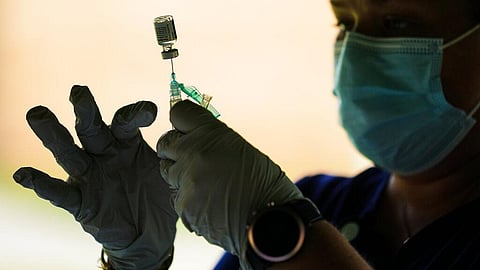

NEW DELHI: India continues to be a leading supplier of vaccines and as much as 70 percent of World Health Organisation's total vaccines are sourced from the country, the Centre said on June 16.
“..India has emerged as a global hub for affordable healthcare solutions and continues to deepen its partnerships with nations through knowledge-sharing, capacity-building, and health diplomacy,” said Union Minister of State for Health and Family Welfare and Chemicals and Fertilizers Anupriya Patel.
Delivering the keynote address at the inaugural session of Second Policymakers’ Forum, which aims to strengthen global collaboration on drug standards and access to affordable medicines, she emphasised India’s commitment to ensuring equitable access to quality-assured medicines.
The minister also stressed the importance of regulatory harmonisation in facilitating global health equity.
She also recalled that during the COVID-19 pandemic, India started the 'Vaccine Maitri' initiative and supplied vaccines to more than 100 friendly countries, which depicts India’s deep sense of responsibility towards global health and its intention of helping friendly countries in times of distress.
Underlining the importance of the Jan Aushadi Kendras, Patel said, “Our Jan Aushadhi Kendras are the shining examples of India’s commitment to provide quality and affordable medicines to all our citizens. Jan Aushadhi has been one of the most powerful instruments of bringing down the out-of-pocket expenditure of our citizens.”
She also said that India has retained the WHO’s Global Benchmarking Tool (GBT) framework, Maturity Level 3 (ML3) status, which reflects the robustness of India's regulatory framework.
Presently, 15 countries in the world recognise the Indian Pharmacopoeia as a book of standards for drugs. Cuba recently became the 15th country to recognise the Indian Pharmacopoeia, said a statement from the health ministry.
“It is not just a regulatory step, but a move towards bringing more alignment in the quality standards, expanding access to safe and effective drugs and making trade in pharmaceuticals smoother than ever before,” the minister said.
“We are committed to helping our partner countries by way of communicating and planning, and hope to continue to work together to advance the regulatory collaboration and promote the recognition of the pharmacopeial standards so that we can strive fast towards the shared goal of ‘Health for All’.”
An international delegation of policymakers and drug regulators from 24 countries is participating in the forum organized by the Indian Pharmacopoeia Commission (IPC) under the aegis of the health ministry, in association with the Ministry of External Affairs.
The Forum has brought together policymakers and senior drug regulatory officials from 22 countries -- Liberia, Togo, Mali, Mauritania, Sierra Leone, Cameroon, Rwanda, Lesotho, Eswatini, Kenya, Botswana, Ethiopia, Comoros, Seychelles, Madagascar, Papua New Guinea, Zimbabwe, St. Lucia, St. Vincent & Grenadines, Cuba, Barbados, and Chile, along with two delegates from the Caribbean Public Health Agency (CARPHA) - Jamaica and Canada.
The ministry said their participation reaffirms India’s position as a valued and trusted partner in the realm of global health.
“The growing international interest in aligning with India’s regulatory frameworks reflects the credibility and scientific rigour of the Indian Pharmacopoeia, as well as India’s proactive role in advancing global public health objectives,” the statement added.